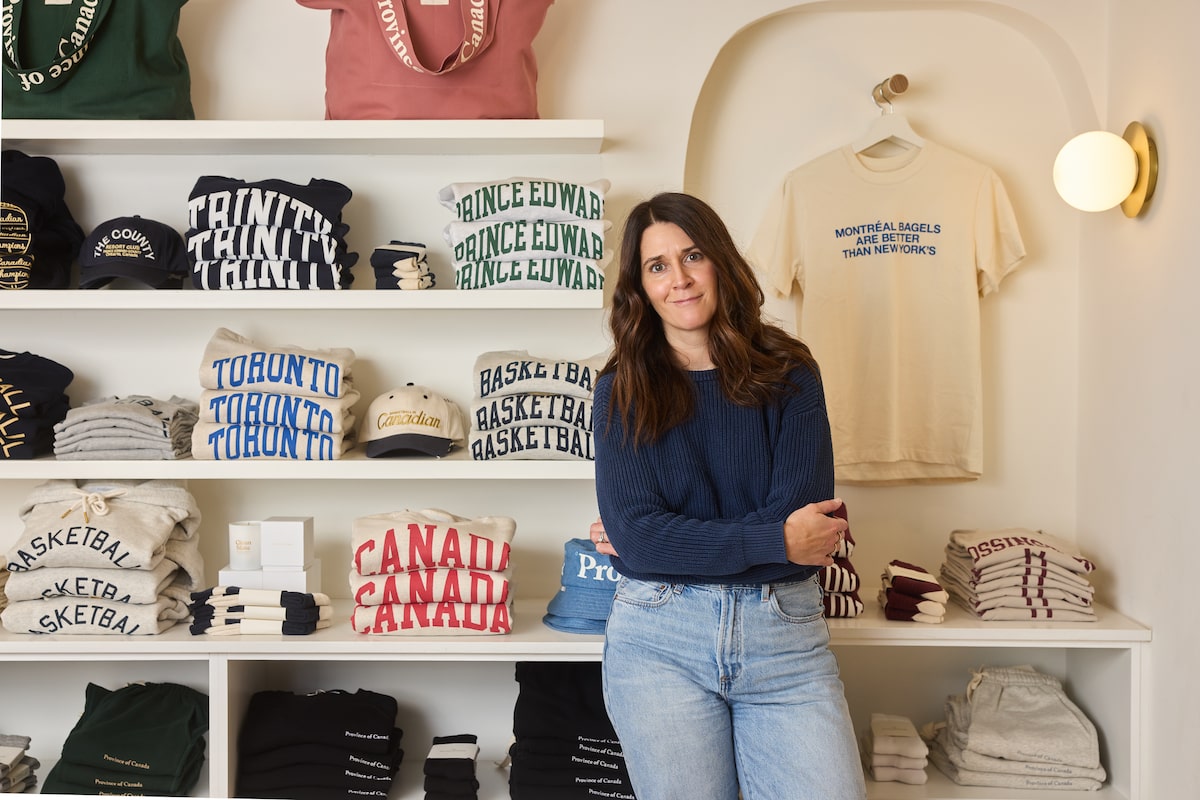When the tariffs took effect, Julie Brown, co-founder of Toronto-based clothing brand Province of Canada, made the difficult decision to pause all shipments to the U.S.David Pike
When news broke that a certain threshold of duty-free shipping to the United States was coming to an end, Julia Brown had a big decision to make.
On the one hand, the co-founder of Toronto-based clothing brand Province of Canada could continue to ship her Canadian-made basics to U.S.-based customers, taking on all of the uncertainty that came with it – from increased shipping costs to delivery delays.
On the other hand, she could pause all shipments across the border, taking the time to monitor the situation as the changes unfolded, and lose a chunk of revenue in the process.
There was no right answer. Ms. Brown and co-founder Jeremy Watt chose to halt shipments on all U.S. orders.
Canadian business owners have been scrambling to adjust their strategies since U.S. President Donald Trump took office for his second term. Tariffs proved to be just the beginning of the hurdles: On Aug. 29, the de minimis exemption – which allowed shipments under $800 to enter the U.S. duty-free – was cancelled. For Province of Canada, pausing U.S. shipments in the wake of this decision has meant an instant 5-per-cent drop in sales.
“It’s a shame for a lot of Canadian businesses and for us,” Ms. Brown says. “It’s significant.”
Province of Canada, which also ships to Europe and Japan, has doubled its Canadian sales in 2025, riding the elbow’s up wave of supporting local businesses.David Pike
Because Province of Canada goods are made in Canada, they fall under the rules of the Canada-United States-Mexico Agreement (CUSMA), which means they should still be able to cross the border duty-free. But Ms. Brown says the in-depth paperwork required for each individual shipment to prove its CUSMA status would be an unsustainable burden on her small team.
“It could take someone 15 to 20 minutes just to prepare one order,” she says. “When you’re shipping hundreds of orders a day, that’s a lot.”
What’s more, CUSMA products still incur tariffs. “CUSMA-originating goods from Canada and Mexico are not exempt from IEEPA (U.S. International Emergency Economic Powers Act) tariffs for postal shipments,” Canada Post said in a statement to The Globe and Mail.
The end of de minimis is another hit for the already struggling postal service, which is battling financial and labour issues, and is likely to see significantly less commercial business to the United States as companies look for duty-savvy shipping methods. To combat this, Canada Post told The Globe that it has partnered with Zonos, a third-party company that specializes in cross-border technology, including duty collection.
For Justin Ng and Josephine Au, co-owners of Vancouver-based matcha brand Emeri, the choice to pause U.S. shipments was a difficult one – especially because American orders currently make up 50 per cent of their business. “We didn’t feel comfortable serving something to our customers when we didn’t have all of the answers in place,” Mr. Ng says.
Justin Ng and Josephine Au, co-owners of Vancouver-based matcha brand Emeri, chose to halt shipping their matcha products to the U.S. despite the fact that American orders made up 50 per cent of their business.Emeri
While Emeri is a Canadian company, products are tariffed based on their country of origin, which in this case is Japan. Mr. Ng says the disorder around shipping timelines, tariff rates and duty calculations were enough to encourage them to pause U.S. shipments.
“At the end of day, we’re customers, too,” Mr. Ng says. “The last thing we want to have is additional fees or tariffs slapped onto our products.”
Mr. Ng says the disorder around shipping timelines, tariff rates and duty calculations were enough to encourage them to pause U.S. shipments.Emeri
Ross Prusakowski, deputy chief economist at Export Development Canada, says it’s too early for there to be any concrete U.S. trade data following the end of the de minimis exemption. Anecdotally, he points to a growing sense of confusion. “What we’re seeing is mostly a lot of uncertainty. A lot of concern.”
Since Mr. Trump started making annexation threats, Canadians have shown a distinct sense of national pride, with “elbows up” messages ricocheting across social media platforms and news outlets, and many people making a conscious effort to buy Canadian products. That, Mr. Prusakowski says, presents an opening.
“I think there is an opportunity to look domestically as consumer attitudes and other business attitudes have shifted and continue to evolve.”
Mr. Ng certainly feels that way. “We always advocate for supporting local,” he says. “Every single purchase or penny counts for Canadian small businesses.”
Canadian brands are balancing the loss of American orders with an influx of Canadian support. “This year has definitely felt like there’s been a spotlight on us,” Ms. Brown says.David Pike
Province of Canada, which also ships to Europe and Japan, has doubled its Canadian sales since Mr. Trump took office in January.
“This year has definitely felt like there’s been a spotlight on us,” Ms. Brown says. “It’s changed the way people think about what they’re buying in every aspect, whether it’s food or clothing. In clothing, there are so few options that are actually made here. I think Canadians have been surprised to learn, ‘I can dress in made-in-Canada basically head-to-toe.’”

